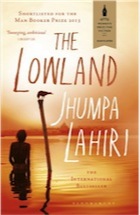With her intricate second novel, set in India and America, Lahiri draws a powerful picture of brotherly bonds broken by politics

Jhumpa Lahiri: adept at depicting the particular unhappinesses at the core of the families she crafts. Photograph: Getty Images
"Happy families are all alike; every unhappy family is unhappy in its own way," wrote Tolstoy in Anna Karenina. In Jhumpa Lahiri's first novel, The Namesake, and her short story collections Unaccustomed Earth and Interpreter of Maladies, she is adept at depicting the particular unhappinesses at the core of the families she crafts. So too in her intricate novel The Lowland, shortlisted for the Baileys Women's Prize for Fiction and Man Booker prize: tracing how brotherly bonds become broken by violent politics, it is suffused with sadness.
 The landscape, as well as the lives unfolding within it, is conjured magnificently: the marshy lowland in Calcutta is thick with water hyacinth, its periphery dotted with simple huts, the poor wading in to forage for food. This is a place where certain creatures "laid eggs that were able to endure the dry season. Others survived by burying themselves in mud, simulating death, waiting for the return of rain". Survival is fraught for the humans, too, in this engrossing novel.
The landscape, as well as the lives unfolding within it, is conjured magnificently: the marshy lowland in Calcutta is thick with water hyacinth, its periphery dotted with simple huts, the poor wading in to forage for food. This is a place where certain creatures "laid eggs that were able to endure the dry season. Others survived by burying themselves in mud, simulating death, waiting for the return of rain". Survival is fraught for the humans, too, in this engrossing novel.
Two brothers, Subhash and Udayan, often walk across the lowland on their way to play football. Though very different, one cautious and one of them reckless, the boys are very close: "Subhash was 13, older by 15 months. But he had no sense of himself without Udayan. From his earliest memories, at every point, his brother was there." Yet this is a novel in which the most tender of ties are torn asunder, and Lahiri traces these lives as they become haunted by the absence of loved ones.
More
 The landscape, as well as the lives unfolding within it, is conjured magnificently: the marshy lowland in Calcutta is thick with water hyacinth, its periphery dotted with simple huts, the poor wading in to forage for food. This is a place where certain creatures "laid eggs that were able to endure the dry season. Others survived by burying themselves in mud, simulating death, waiting for the return of rain". Survival is fraught for the humans, too, in this engrossing novel.
The landscape, as well as the lives unfolding within it, is conjured magnificently: the marshy lowland in Calcutta is thick with water hyacinth, its periphery dotted with simple huts, the poor wading in to forage for food. This is a place where certain creatures "laid eggs that were able to endure the dry season. Others survived by burying themselves in mud, simulating death, waiting for the return of rain". Survival is fraught for the humans, too, in this engrossing novel.Two brothers, Subhash and Udayan, often walk across the lowland on their way to play football. Though very different, one cautious and one of them reckless, the boys are very close: "Subhash was 13, older by 15 months. But he had no sense of himself without Udayan. From his earliest memories, at every point, his brother was there." Yet this is a novel in which the most tender of ties are torn asunder, and Lahiri traces these lives as they become haunted by the absence of loved ones.
More

No comments:
Post a Comment